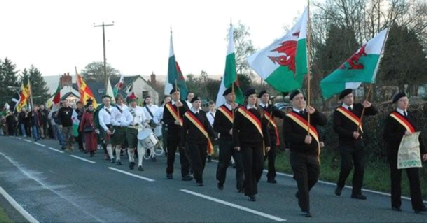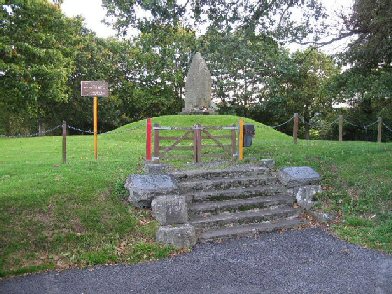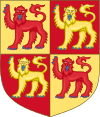|
Llywelyn ap Gruffudd (c.1223-1282), or
Llywelyn Ein Llyw Olaf (lit: our last leader), was
the last prince of an independent Wales. He died at the Battle
of Orewin Bridge on 11 December 1282.
He was the grandson
of Llywelyn ap Iorwerth, also known as
Llywelyn Fawr (the
Great), whose efforts to create a single Welsh principality
ended with his death in 1240. Llywelyn Fawr was succeeded as
ruler of Gwynedd by his younger son Dafydd ap Llywelyn, who died
in 1246 without an heir.
Llywelyn ap Gruffudd
was well placed to succeed Dafydd, his uncle. In 1247 Llywelyn
and his brother Owain signed the Treaty of Woodstock with King
Henry III. The treaty restricted the brothers' rule to parts of
Gwynedd west of the River Conwy, while the remainder of Conwy -
the Perfeddwlad - remained under English control.
Within two years,
however, Llywelyn had gained control of the Perfeddwlad and most
of the Pura Wallia - parts of Wales under native Welsh rule. By
early 1258 he was using the title Prince of Wales, although the
English crown refused to acknowledge him as such.
When Henry was
temporarily deposed by Baron Simon de Montfort after the Battle
of Lewes in 1264, Llywelyn allied himself to the new ruler. The
Treaty of Pipton, signed the following year, set out the terms
Llywelyn had desired for several years: formal recognition as
Prince of Wales and overlord of the other Welsh rulers.
De Montfort died at
the Battle of Evesham in 1265, and the resulting English power
vacuum allowed Llywelyn to consolidate his control of Welsh
territory. He was formally recognised as Prince of Wales by
Henry III with the signing of the Treaty of Montgomery on 29
September 1267.
This was the peak of
Llywelyn's power, and the only occasion on which an English
ruler recognised the right of a ruler of Gwynedd over Wales.
Henry ceded Builth, Brecon and Gwerthrynion to Llywelyn, granted
him Whittington Castle in what is now Shropshire, and gave
assurance that no castle would be built at Hawarden for 60
years, in return for payments totalling 25,000 marks (£16,667)
over 10 years.
However,
the
Marcher lords were continually harassing the Welsh, looking to
expand their territories. When the English, lord of Glamorgan
attacked the princes of south Wales, and commenced building
Caerffili (Caerphilly)
castle in 1267, in territory recently conquered from the local
princes, Llywelyn attacked and demolished it.
Henry died in 1272
and was succeeded by Edward I. Relations between the new king
and the Welsh prince swiftly deteriorated, not least because of
Llywelyn's continued alliance with the de Montfort family and
Edward's incessant desire to rule Wales, Scotland & Ireland.
A united,
independent Wales, with Llywelyn at its head had to be
destroyed.
 In
1276 Edward declared Llywelyn a rebel and the following year
amassed an army to march on Conwy. Edward's men confiscated the
substantial corn harvest in Anglesey, depriving Llywelyn's men
of vital food supplies and forcing the Welsh prince to
surrender. In
1276 Edward declared Llywelyn a rebel and the following year
amassed an army to march on Conwy. Edward's men confiscated the
substantial corn harvest in Anglesey, depriving Llywelyn's men
of vital food supplies and forcing the Welsh prince to
surrender.
This led to the
Treaty of Aberconwy, which guaranteed peace but limited
Llywelyn's power to the west of the River Conwy. Although he
retained the title Prince of Wales, he was no longer the
overlord of other Welsh rulers.
Although Llywelyn
initially refused to acknowledge Edward as his sovereign ruler,
he eventually paid homage to the king. In return Edward allowed
Llywelyn to marry Eleanor de Montfort, who had been imprisoned
in Windsor Castle. The pair married at Worcester Cathedral in
1278, and Eleanor became Princess of Wales and Lady of Snowdon.
Peace came to an end
in 1282 when Llywelyn's other brother Dafydd ap Gruffudd - a
quick-tempered firebrand at the best of times - revolted against
the English, capturing Hawarden Castle and murdering its
garrison. The insurrection spread to other parts of Wales and,
although Llywelyn was not immediately involved, he felt duty
bound to support his brother.
Edward repeated his
tactics of 1277, with his troops once again capturing Anglesey
and large parts of Gwynedd. Edward offered Llywelyn a large
English estate if he were to surrender Wales, while Dafydd was
to be exiled on crusade and unable to return to Britain without
the king's permission.
Llywelyn refused the
offer, proclaiming that he would stand by the people whom his
ancestors had watched over since "the days of Camber, son of
Brutus." Camber, or Kamber, was the mythical first king of
Cambria invented by the 12th century historian Geoffrey of
Monmouth.
 Llywelyn
left Dafydd to defend Gwynedd, and took his men to mid and
southern Wales to rally support. On 11 December 1282 his army -
around 7,000 infantry and 160 cavalry - was positioned on a
hillside near the village of Cilmeri, ready to fend off attacks
from the south across Orewin Bridge. Llywelyn
left Dafydd to defend Gwynedd, and took his men to mid and
southern Wales to rally support. On 11 December 1282 his army -
around 7,000 infantry and 160 cavalry - was positioned on a
hillside near the village of Cilmeri, ready to fend off attacks
from the south across Orewin Bridge.
The land was under
the control of Marcher Lords, some of whom had pledged
allegiance to Llywelyn. Three, however - Roger l'Estrange, John
Giffard and Edmund Mortimer - were supporters of Edward, and had
amassed an army of foot soldiers, archers and cavalrymen.
Llywelyn left his
men; it is believed that he, and perhaps a group of retainers,
went to speak to the Marcher Lords before fighting began. In the
meantime, archers from the Marcher force crossed a ford around
two miles from the bridge, allowing them to attack the Welsh
army from another side.
As the Welsh turned
to confront the archers they left the bridge undefended. The
English seized the moment to attack. Mounted soldiers charged
across Orewin Bridge, causing the leaderless and disorganised
Welsh army to flee.
There are two
versions of what happened next. The first has it that Llywelyn
hurriedly returned to the battlefield, but was cut down by a
lone lancer. The second is that Llywelyn and several members of
his entourage were separated from the rest of his army and
chased into a nearby wood, where he was surrounded and struck
down (at a site nr. Cilmeri,
Builth Wells).
Dafydd ap Gruffudd
was killed shortly after.
As he lay dying,
Llywelyn asked for a priest and revealed his identity. He was
killed and his head was cut off. It was sent to Edward at
Rhuddlan before being exhibited over the gate to the Tower of
London.
As with the
circumstances surrounding his death, Llywelyn's final resting
place is unclear. His body may have been interred at the
Cistercian Abbey at Abbeycwmhir, although his body is said to
have been enclosed in a stone coffin on land where Llanrumney
Hall was later built in Cardiff.
The beheading of Llywelyn, the
imprisonment of his family, the melting down of the Welsh crown
jewels and the destruction of the royal mausoleums, would all
have been calculated to oppress the Welsh people. The building
of the huge castles of the north from 1284 to 1308, would have
compounded the oppression. Llywelyn’s treatment represented
absolute defeat. The Elegies sung at Llywelyn’s death depicted
this as “the end of the world”. However, this was not the end,
there was a revolt in 1287, 1291, 1294-5, 1316, 1369, 1372-3,
1400-1415 and 1485 (when Henry Tudur became king of England).
Modern historians (especially from 1979 to 1997), have inferred
that 1282 and the death of Llywelyn represented the end of any
chance that Wales would develop as an independent unit.
|
Native
Princes of Gwynedd / Wales |
|
Monarch |
Birth
|
Reign |
|
Rhodri
Mawr |
circa
820-878 |
 |
|
Hywel
Dda |
circa 880
- 950 |
|
Grufydd
ap Llywelyn |
circa
1007-1063 |
|
Grufydd
ap Cynan |
circa
1055 - 1137 |
|
Owain
Gwynedd |
circa
1080 |
1137-1170 |
|
Llywelyn Fawr (the Great) - Llywelyn ap Iorwerth |
1173 |
1199-1240 |
|
Dafydd ap
Llywelyn |
1212
|
1240-1246 |
|
Llywelyn Ein Llyw Olaf (the Last) - Llywelyn
ap Gruffudd |
circa
1223 |
1246-1282 |
|
Owain
Glyndwr |
circa
1349 |
1400 - 1404 |
Source:
Joe Goodden, BBC
|